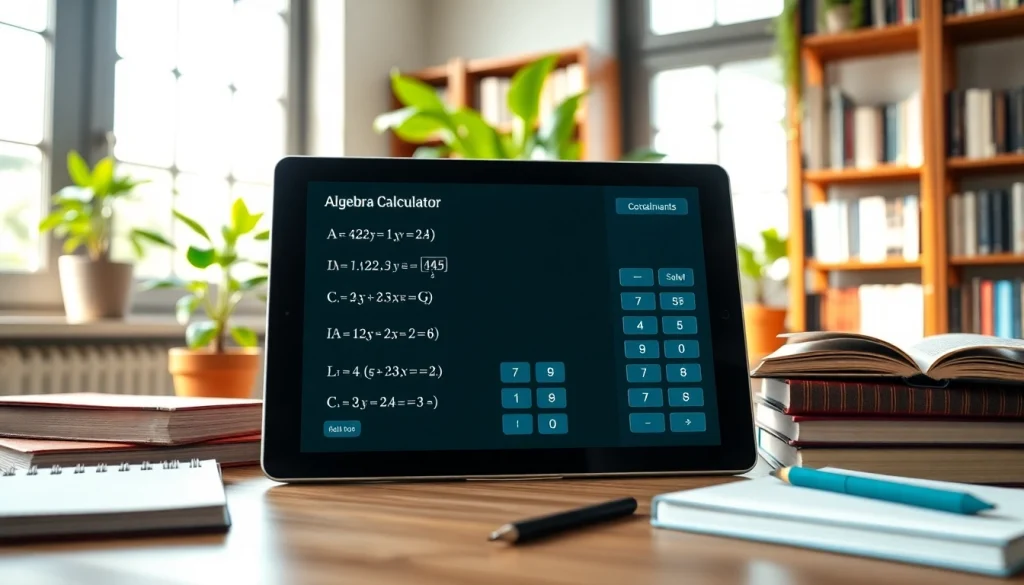
Understanding the Algebra Calculator
In the realm of mathematics, particularly in algebra, the tools we use significantly enhance our ability to perform calculations efficiently and accurately. One such invaluable tool is the Algebra Calculator, which simplifies complex algebraic problems into manageable steps. This article delves into the features, benefits, and operational mechanisms of algebra calculators, offering insights into how they can transform the learning and problem-solving process in algebra.
What is an Algebra Calculator?
An algebra calculator is a specialized online tool designed to solve various algebraic equations and expressions. Typically, users can input equations or algebraic expressions, and the calculator provides solutions, often detailing each step in the solving process. These calculators can handle a wide range of algebraic concepts, including linear equations, quadratic equations, polynomials, and more.
Benefits of Using an Algebra Calculator
Algebra calculators are not just for those who struggle with math; they also serve as excellent resources for learners and professionals alike. Here are some notable benefits:
- Step-by-step Solutions: Algebra calculators provide detailed workings of the solutions, which helps users understand the methodology behind solving equations.
- Time Efficiency: Complex calculations that might take a significant amount of time to solve by hand can be computed nearly instantaneously.
- Accessibility: Being available online means anyone can access these calculators anytime, anywhere, making them ideal for students and professionals on the go.
- Error Reduction: The precision of calculators reduces the likelihood of human errors in computation.
How Algebra Calculators Work
Algebra calculators process inputs through algorithms that recognize and analyze mathematical equations. When a user inputs a problem, the calculator parses the query, identifies the mathematical operations needed, and applies appropriate formulas to derive the solution. Most calculators also have built-in functions to handle various algebraic operations, from addition and subtraction to factoring and graphing.
Key Features of Algebra Calculators
Algebra calculators come packed with features designed to assist users in their mathematical endeavors. Understanding these features can enhance a user’s experience when solving problems.
Step-by-Step Problem Solving
One of the hallmark features of an algebra calculator is its ability to present solutions step-by-step. By breaking down the solving process, users can comprehend how to arrive at the answer, making the calculator a powerful educational tool. This is particularly beneficial for students learning new concepts or revising for exams.
Support for Various Algebraic Functions
Algebra calculators typically support a wide range of algebraic functions, including:
- Solving linear equations
- Factoring polynomials
- Graphing equations
- Calculating derivatives and integrals in calculus-related algebra
This versatility ensures that users can tackle diverse mathematical challenges all in one platform.
User-Friendly Interface
The interface of algebra calculators is designed with the user in mind. With clear input fields, intuitive navigation, and visually organized results, users can quickly grasp how to use the calculator, regardless of their mathematical skill level. Many calculators also include tutorials and examples that guide users through the functionalities, further enhancing ease of use.
How to Use an Algebra Calculator Effectively
While algebra calculators are designed to simplify problem-solving, users must know how to maximize their potential. Here are some best practices for getting the most out of an algebra calculator.
Inputting Problems Correctly
The accuracy of results from an algebra calculator heavily relies on the correct formulation of the input problem. It’s essential to use proper mathematical notation and syntax. For instance, users should input equations in a recognizable format, like using ‘^’ for exponents. Taking time to ensure that the input is correct can save users from confusion later on.
Interpreting the Results
Understanding the output of the calculator is as important as entering the problem correctly. Users should not just focus on the final answer but also take the time to review the steps leading to that conclusion. Each step often contains valuable insights into alternative solving methods or verification of the solution.
Common Mistakes to Avoid
While using an algebra calculator can reduce mistakes, it is still possible to encounter errors if not cautious. Common mistakes include:
- Misinterpreting the calculator’s output
- Inputting problems with incorrect syntax or format
- Over-reliance on the calculator without attempting to understand the concepts
Being aware of these pitfalls can enhance the overall experience and efficacy of the calculator’s usage.
Choosing the Right Algebra Calculator for You
With numerous options available online, selecting the most suitable algebra calculator can feel daunting. Here are key considerations to keep in mind when choosing your calculator.
Best Free Online Algebra Calculators
Many calculators available online offer robust functionalities without any cost. Some of the most recommended free online algebra calculators include:
- MathPapa Algebra Calculator
- Symbolab Algebra Calculator
- Mathway
Each of these calculators has unique features tailored to different types of algebraic problems, so exploring a few will help you find the best fit.
Comparing Features Across Popular Calculators
When selecting an algebra calculator, compare features relevant to your needs. Look for:
- The range of problems it can solve
- Availability of step-by-step solutions
- Ease of use and interface design
- User support and resources available, such as tutorials or customer service
Understanding the strengths and weaknesses of different calculators will ensure you select one that meets your unique requirements.
User Reviews and Ratings
Reading user reviews can provide insights into the reliability and effectiveness of a calculator. Look for feedback related to:
- Accuracy of results
- Usability of the calculator
- Support services and response times
Third-party reviews and academic endorsements can also help guide your choice, ultimately leading to a more satisfactory experience.
Advanced Uses of Algebra Calculators
Beyond basic solutions, algebra calculators have facilitated various advanced applications that enrich learning and professional environments.
Integrating Calculators in Educational Settings
Educators can harness the power of algebra calculators within classrooms to enhance teaching methodologies. By employing calculators, teachers can:
- Demonstrate complex algebraic concepts with real-time solutions.
- Encourage collaborative learning by allowing students to work through problems together using the calculator.
- Utilize the calculators to support differentiated learning, adjusting the pace according to students’ needs.
Such integration offers a modern approach to teaching that can engage students more effectively.
Using Calculators for Complex Algebra Problems
Algebra calculators can perform intricate calculations that may be beyond the capability of the average student or novice user, such as:
- Solving systems of equations
- Factoring higher degree polynomials
- Analyzing algebraic functions through graphical representations
By utilizing calculators in higher level mathematical explorations, users can tackle issues they might struggle with otherwise, ultimately improving their understanding of comprehensive algebra concepts.
Future Trends in Algebra Calculation Tools
The landscape of algebra calculators is continuously evolving, with ongoing technological advancements. Future trends may include:
- Greater integration of artificial intelligence to provide customized learning experiences based on user performance.
- Enhanced mobile applications that allow algebra calculations on-the-go.
- Web-based collaborative tools for shared learning experiences.
As technology continues to develop, algebra calculators are expected to become even more sophisticated, making algebra accessible and enjoyable for all.






